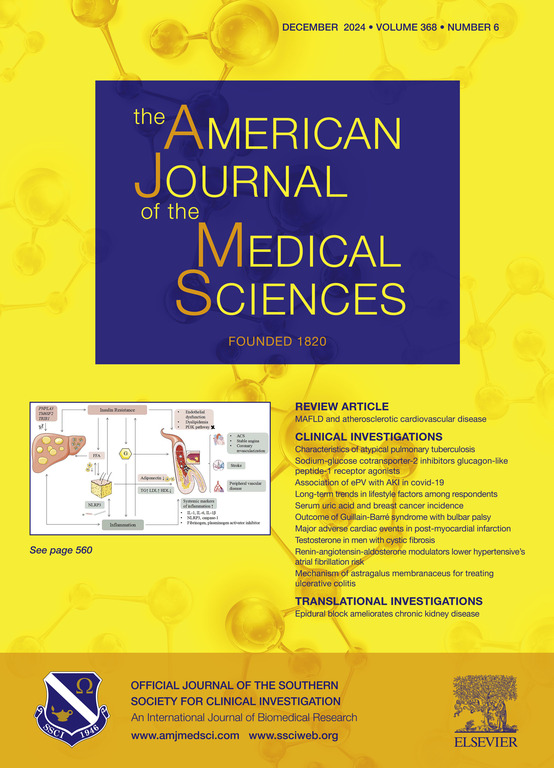The prognostic value of the MAGGIC risk score in patients with acute pulmonary embolism
IF 2.3
4区 医学
Q2 MEDICINE, GENERAL & INTERNAL
引用次数: 0
Abstract
Objectives
Acute pulmonary embolism (PE) is a potentially life-threatening condition characterized by the sudden blockage of the pulmonary arteries. Although the MAGGIC risk score has emerged as a valuable tool in predicting outcomes in patients with chronic heart failure, it has also been demonstrated and identified as a prognostic model in various cardiac diseases other than heart failure. In this study, we aimed to investigate the relationship between MAGGIC score and adverse outcomes in patients with PE.
Materials and Methods
A total of 302 consecutive patients diagnosed with acute PE were retrospectively included in the present study. For each patient, the MAGGIC score was calculated. The study population was divided into two groups according to the median value of MAGGIC score.
Results
Patients with high MAGGIC score had a significantly higher proportion of elderly and female individuals, lower BMI, higher presence of CAD, DM, AFib, HF, HT, CKD, COPD, and ACEI/ARB and NOAC usage. Logistic regression analyses was carried out using univariate and multivariate analysis to predict the in-hospital and 30-day mortality predictors in the included PE patients. For in-hospital mortality, diastolic blood pressure, heart rate, RV dilatation, and the MAGGIC score (HR: 1.166, 95% CI 1.077–1.263, p < 0.001) and for short-term mortality, sPESI and the MAGGIC score (HR: 1.925, 95% CI 1.243–2.983, p:0.003) were found to be independent predictors for adverse outcomes in patients with acute PE.
Conclusion
Our study demonstrates that the MAGGIC score can be applied as a valuable prognostic tool for acute pulmonary embolism.
急性肺栓塞患者 MAGGIC 风险评分的预后价值。
目的:急性肺栓塞(PE)是一种可能危及生命的疾病,其特点是肺动脉突然阻塞。尽管 MAGGIC 风险评分已成为预测慢性心力衰竭患者预后的重要工具,但它在心力衰竭以外的各种心脏疾病中也被证明和确定为预后模型。在这项研究中,我们旨在调查 MAGGIC 评分与 PE 患者不良预后之间的关系:本研究回顾性纳入了 302 例连续诊断为急性 PE 的患者。计算每位患者的 MAGGIC 评分。根据 MAGGIC 评分的中位值将研究对象分为两组:结果:MAGGIC评分高的患者中,老年和女性比例明显更高,体重指数更低,患有CAD、DM、心房颤动、高血压、慢性肾脏病、慢性阻塞性肺病以及使用ACEI/ARB和NOAC的比例更高。采用单变量和多变量分析方法进行了逻辑回归分析,以预测所纳入的 PE 患者的院内死亡率和 30 天死亡率预测因素。在院内死亡率方面,舒张压、心率、RV扩张和MAGGIC评分(HR:1.166,95% CI 1.077-1.263,P<0.001);在短期死亡率方面,sPESI和MAGGIC评分(HR:1.925,95% CI 1.243-2.983,P:0.003)是急性PE患者不良结局的独立预测因素:我们的研究表明,MAGGIC 评分可作为急性肺栓塞的重要预后工具。
本文章由计算机程序翻译,如有差异,请以英文原文为准。
求助全文
约1分钟内获得全文
求助全文
来源期刊
CiteScore
4.40
自引率
0.00%
发文量
303
审稿时长
1.5 months
期刊介绍:
The American Journal of The Medical Sciences (AJMS), founded in 1820, is the 2nd oldest medical journal in the United States. The AJMS is the official journal of the Southern Society for Clinical Investigation (SSCI). The SSCI is dedicated to the advancement of medical research and the exchange of knowledge, information and ideas. Its members are committed to mentoring future generations of medical investigators and promoting careers in academic medicine. The AJMS publishes, on a monthly basis, peer-reviewed articles in the field of internal medicine and its subspecialties, which include:
Original clinical and basic science investigations
Review articles
Online Images in the Medical Sciences
Special Features Include:
Patient-Centered Focused Reviews
History of Medicine
The Science of Medical Education.

 求助内容:
求助内容: 应助结果提醒方式:
应助结果提醒方式:


